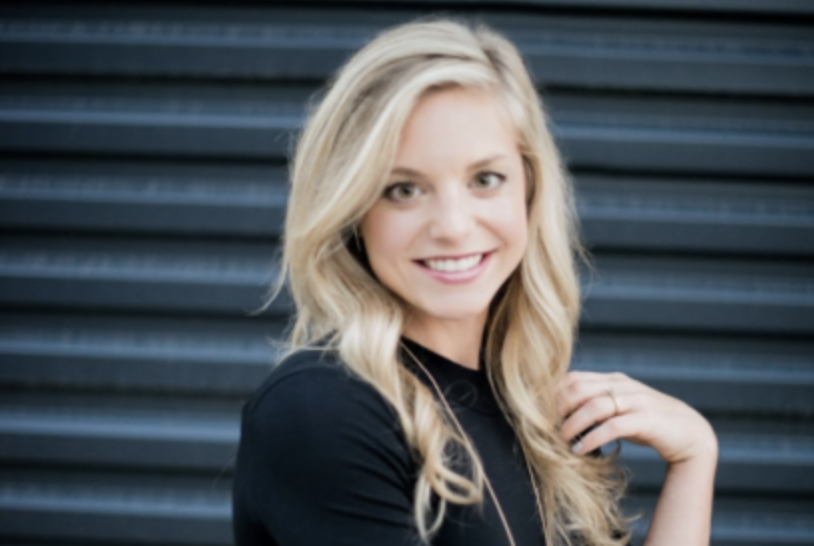Remember the viral Ice Bucket Challenge that began in 2014? It was a campaign to raise awareness and research funding for the neurodegenerative disease amyotrophic lateral sclerosis, aka ALS.
Fast forward to 2017 and the founding of SimpliHere, a mobile platform that was built to help patients and families communicate and stay connected throughout their ALS journey. Social entrepreneur and female founder Joanna Rosenberg, MBA, (Boston Founder Institute graduate) was inspired to build the healthtech impact startup SimpliHere from first-hand experience with her mother who had the motor neuron disease.

Communication for ALS and Other Neurodegenerative Disease Patients
SimpliHere addresses an issue people with neurodegenerative diseases experience that is an inherent part of existing: communication. We interact at first through crying and sign language, and shortly thereafter with verbal language. Yet for many none of these options are feasible in a later phase. A full third of the 27 million people who live with neurodegenerative diseases lose their ability to speak.
In 2012 and 2013 when Rosenberg tried using free mobile apps she found that the available applications were not very intuitive nor usable. After a few years of doing advocacy and awareness work for ALS and talking with other people affected by it, Rosenberg decided to create a solution.
Before building the app, Rosenberg interviewed a mixture of stakeholders: physical therapists, speech therapists, and a case worker. These interviews, paired with her 3 years of personal experience with helping manage ALS, prepared the team to build a strong first version of the iOS app (chosen because the ALS Association and caregivers typically use iOS) with her team of designers and web developers.
The health and well-being impact startup’s simple interface provides a tool that empowers users to quickly and effectively interact with others without speaking. Under a caregiver communication talk bubble icon common requests are broken into 3 categories: needs, wants, and emotions (see the right hand image below). These options facilitate requests and empower patients with more control while they undergo the learning curve needed to adapt to their new lifestyles. For example, SimpliHere’s emotions category lists 4 emotions and leaves space for a fifth option that is customizable.

A secondary convenience feature the augmentative and alternative communications platform provides users with is finding physical equipment. Currently 6 categories exist in the equipment section: bathroom assists, bedroom safety aids, low tech solutions (such as laser pointers), eating and drinking aids, dressing aids, and mobility aids. Users can purchase these items like handrails, mugs with two handles, and walkers directly through the app. This feature makes the one-stop-shop and tool even more valuable because it provides multiple use cases for both the patient and caregivers, which was a resource Rosenberg had not found when she needed it most. As such, SimpliHere does as much as possible to relieve and simplify the work caregivers pour into ALS patients.
Building a niche community
Other keys to maintaining a high quality of life are community and access to healthcare providers. While the ice bucket challenge was widespread, finding others who are learning about and dealing with ALS in the U.S. is a challenge that is limited to less than 1 in 20,000. One of SimpliHere’s features makes it easy to connect and share with other users to create a support system. With another feature users can contact their healthcare providers with just a few clicks after they've a list with their providers.
In addition, SimpliHere makes it easy to access news about ALS and stay up-to-date with the latest research. This feature ties into the company’s longer term goals. Rosenberg shared,
If I can grow the business to a point where a portion of profits go back to research directly, that would be my ultimate goal
She wants to help contribute to research that will “end [ALS] once and for all."
Impact startups: a common misconception
Working on impact startups like SimpliHere rather than traditional technology startups comes with its own set of challenges, and Ronsenberg has begun to experience these obstacles. She has found that there is a lack of understanding and awareness of what an impact business is, which sparks pushback and skepticism. Rosenberg shared that
People assume that what I’m doing is a nonprofit.
However, she likes running an impact company, because her aim is to build a sustainable business that can benefit others in the short and long run. Rosenberg advises future impact founders to enter into conversations with users and investors being aware of this misconception, and positioning their businesses accordingly.
We’re trying to get to the same end result [as nonprofits], but through a different model. There’s no one-size-fits-all, even in the nonprofit world.
To stick with the goal of helping people and not adding a financial burden to it’s users, SimpliHere is free, and has been downloaded over 800 times (as of March 2020). For $9.99/month, users have access to using the voice app Louise. Down the road the health tech startup plans to enhance and humanize the user’s experience by incorporating a voice bank tool that preserves the patient’s voice to be later used with speech generating devices.
To download the app, go to the app store on an iPhone or an iPad.
Graduates of the Founder Institute are creating some of the world's fastest growing startups, having raised over 2BN in funding, and building products people love across over 200 cities worldwide.
See the most recent news from our Grads at FI.co/news, or learn more about their stories at FI.co/journey.




